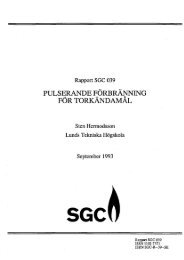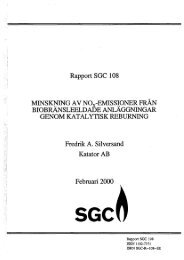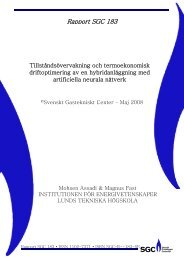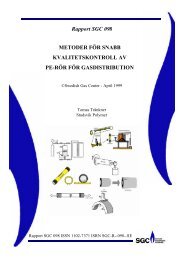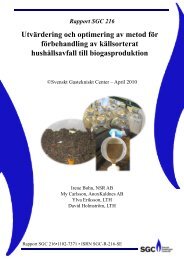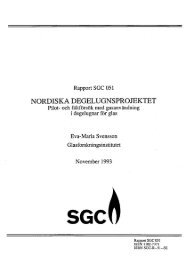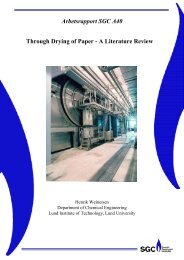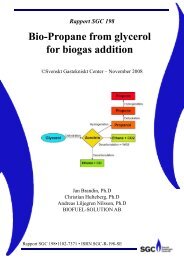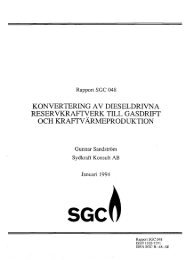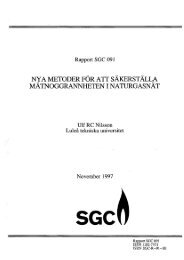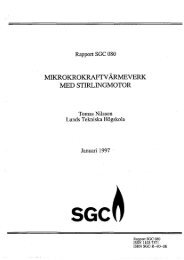Adding gas from biomass to the gas grid - SGC
Adding gas from biomass to the gas grid - SGC
Adding gas from biomass to the gas grid - SGC
- No tags were found...
Create successful ePaper yourself
Turn your PDF publications into a flip-book with our unique Google optimized e-Paper software.
Energy technology research concentrates on incineration technology, <strong>gas</strong>ification technology andflue <strong>gas</strong> and exhaust purification technology and is expected <strong>to</strong> lead <strong>to</strong> more efficient energytransformation methods and increased energy efficiency in industrial processes.According <strong>to</strong> <strong>the</strong> Riksdag's energy policy decision energy research will take a slightly differentcourse in <strong>the</strong> future in that energy system research and collaboration with <strong>the</strong> Baltic states will beemphasised.Energy Media 1970 1980 1990 1996 2010Crude oil and oil products 1260 1026 673 781 803Natural <strong>gas</strong>, <strong>to</strong>wn <strong>gas</strong> 25 32 47Coal and coke 65 68 112 112 115Biofuels, peat etc. 155 173 234 313 353Waste heat etc.,district heating systems 4 29 29 42Hydropower, gross 148 212 263 187 243Nuclear power, gross 94 245 266 241Nuclear power, gross(international method) 274 720 799 698Electricity import minus export 14 4 -11 22 10Total energy supply 1645 1580 1573 1746 1854Total energy supply,international method 1645 1760 2048 2279 2311Table 59: Energy supply, 1970-1996, forecast for 2010, in PJIn 1999 a waste tax for organic wastes <strong>to</strong> landfills was launched. The tax amounts <strong>to</strong> approximately€ 30/<strong>to</strong>n. This tax has promoted <strong>the</strong> interest for digestion as a waste management method in <strong>the</strong>communities. In <strong>the</strong> year 2005 <strong>the</strong>re will be a prohibition concerning landfilling of organic wastes.This is supposed <strong>to</strong> result in an increasing market for digestion/bio<strong>gas</strong> production as a wasterecycling method.Bio<strong>gas</strong> as vehicle fuelUtilisation of <strong>the</strong> natural <strong>gas</strong> <strong>grid</strong> as a transporting system for bio<strong>gas</strong> plays an important role inpromoting <strong>the</strong> use of bio<strong>gas</strong> as a vehicle fuel, as it will be possible <strong>to</strong> produce bio<strong>gas</strong> in any placealong <strong>the</strong> <strong>gas</strong> <strong>grid</strong> with <strong>the</strong> possibility <strong>to</strong> trade 100% of <strong>the</strong> <strong>gas</strong> as vehicle fuel.The value for bio<strong>gas</strong> is at <strong>the</strong> moment highest if <strong>the</strong> <strong>gas</strong> can be used as vehicle fuel. The price forbio<strong>gas</strong> as vehicle fuel in Sweden was in <strong>the</strong> autumn of 2000 around 70 €ct/m 3 . This corresponds <strong>to</strong>a petrol price of 70 €ct/litre that makes it competitive on <strong>the</strong> market even though <strong>the</strong> bio<strong>gas</strong> carscost 3 - 5 k€. Bio<strong>gas</strong> as vehicle fuel is relieved <strong>from</strong> taxes through an amendment <strong>to</strong> <strong>the</strong> EUPetroleum directive 92/81/EEG. This gives bio<strong>gas</strong> a long term potential as a vehicle fuel if it can beupgraded and distributed <strong>to</strong> <strong>the</strong> market via <strong>the</strong> natural <strong>gas</strong> <strong>grid</strong>.page: 113



